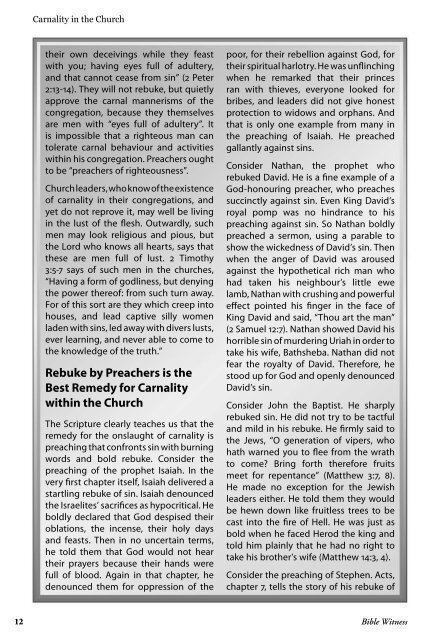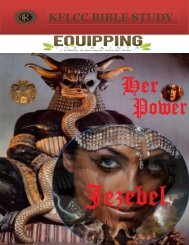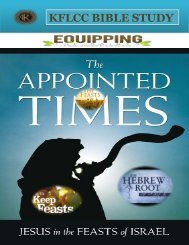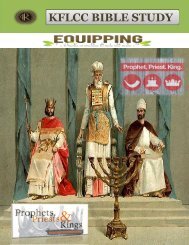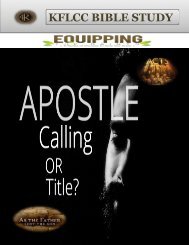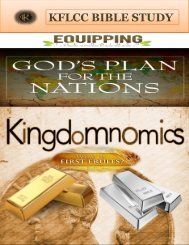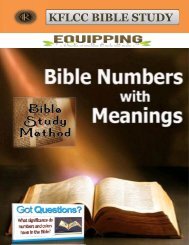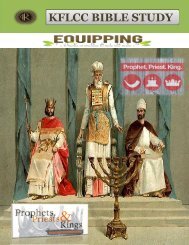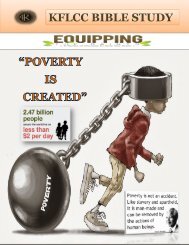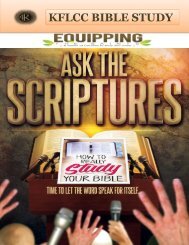Carnality Of The Five Churches
Bible Study
Bible Study
You also want an ePaper? Increase the reach of your titles
YUMPU automatically turns print PDFs into web optimized ePapers that Google loves.
<strong>Carnality</strong> in the Church<br />
their own deceivings while they feast<br />
with you; having eyes full of adultery,<br />
and that cannot cease from sin” (2 Peter<br />
2:13-14). <strong>The</strong>y will not rebuke, but quietly<br />
approve the carnal mannerisms of the<br />
congregation, because they themselves<br />
are men with “eyes full of adultery”. It<br />
is impossible that a righteous man can<br />
tolerate carnal behaviour and activities<br />
within his congregation. Preachers ought<br />
to be “preachers of righteousness”.<br />
Church leaders, who know of the existence<br />
of carnality in their congregations, and<br />
yet do not reprove it, may well be living<br />
in the lust of the flesh. Outwardly, such<br />
men may look religious and pious, but<br />
the Lord who knows all hearts, says that<br />
these are men full of lust. 2 Timothy<br />
3:5-7 says of such men in the churches,<br />
“Having a form of godliness, but denying<br />
the power thereof: from such turn away.<br />
For of this sort are they which creep into<br />
houses, and lead captive silly women<br />
laden with sins, led away with divers lusts,<br />
ever learning, and never able to come to<br />
the knowledge of the truth.”<br />
Rebuke by Preachers is the<br />
Best Remedy for <strong>Carnality</strong><br />
within the Church<br />
<strong>The</strong> Scripture clearly teaches us that the<br />
remedy for the onslaught of carnality is<br />
preaching that confronts sin with burning<br />
words and bold rebuke. Consider the<br />
preaching of the prophet Isaiah. In the<br />
very first chapter itself, Isaiah delivered a<br />
startling rebuke of sin. Isaiah denounced<br />
the Israelites’ sacrifices as hypocritical. He<br />
boldly declared that God despised their<br />
oblations, the incense, their holy days<br />
and feasts. <strong>The</strong>n in no uncertain terms,<br />
he told them that God would not hear<br />
their prayers because their hands were<br />
full of blood. Again in that chapter, he<br />
denounced them for oppression of the<br />
poor, for their rebellion against God, for<br />
their spiritual harlotry. He was unflinching<br />
when he remarked that their princes<br />
ran with thieves, everyone looked for<br />
bribes, and leaders did not give honest<br />
protection to widows and orphans. And<br />
that is only one example from many in<br />
the preaching of Isaiah. He preached<br />
gallantly against sins.<br />
Consider Nathan, the prophet who<br />
rebuked David. He is a fine example of a<br />
God-honouring preacher, who preaches<br />
succinctly against sin. Even King David’s<br />
royal pomp was no hindrance to his<br />
preaching against sin. So Nathan boldly<br />
preached a sermon, using a parable to<br />
show the wickedness of David’s sin. <strong>The</strong>n<br />
when the anger of David was aroused<br />
against the hypothetical rich man who<br />
had taken his neighbour’s little ewe<br />
lamb, Nathan with crushing and powerful<br />
effect pointed his finger in the face of<br />
King David and said, “Thou art the man”<br />
(2 Samuel 12:7). Nathan showed David his<br />
horrible sin of murdering Uriah in order to<br />
take his wife, Bathsheba. Nathan did not<br />
fear the royalty of David. <strong>The</strong>refore, he<br />
stood up for God and openly denounced<br />
David’s sin.<br />
Consider John the Baptist. He sharply<br />
rebuked sin. He did not try to be tactful<br />
and mild in his rebuke. He firmly said to<br />
the Jews, “O generation of vipers, who<br />
hath warned you to flee from the wrath<br />
to come? Bring forth therefore fruits<br />
meet for repentance” (Matthew 3:7, 8).<br />
He made no exception for the Jewish<br />
leaders either. He told them they would<br />
be hewn down like fruitless trees to be<br />
cast into the fire of Hell. He was just as<br />
bold when he faced Herod the king and<br />
told him plainly that he had no right to<br />
take his brother’s wife (Matthew 14:3, 4).<br />
Consider the preaching of Stephen. Acts,<br />
chapter 7, tells the story of his rebuke of<br />
12 Bible Witness


